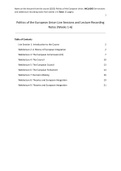Notes de cours
Politics of the European Union Live Sessions and Lecture Recording Notes (Weeks 1-6) - GRADE 8,0
- Cours
- Établissement
Notes on the lectures from the course (2022) Politics of the European Union. INCLUDES live sessions and weblecture recording notes from weeks 1-6 (Total: 25 pages).
[Montrer plus]



